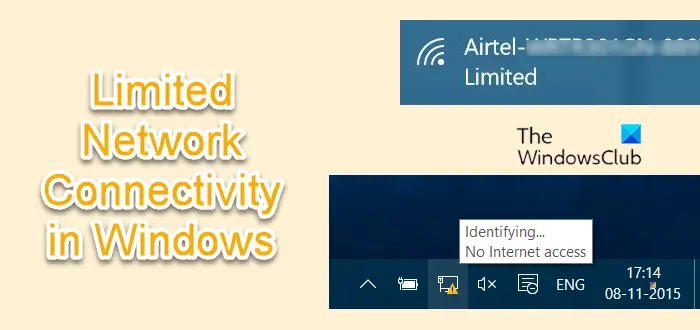Fix Limited Network Connectivity in Windows
A Limited Network Connectivity message means that you have a weak connection or you have used a wrong passcode. Specifically, this is what it means: Many times, the problem appears because of wrong icon mapping. So the first thing you should do if you see a Limited Network Connectivity message is to ensure that all your cables are connected properly and then reboot your router and restart your computer. Turn off your Wi-Fi interface and turn it back on again. Restarting the computer helps reset the internal modem. This will help get rid of the problem in most cases. In case this does not help or if the issue frequently occurs, see if any of this helps you:
1] Recreate the Network profile
Delete the Network profile and re-create it again. To delete it, run command prompt as administrator, type the following and hit Enter:
2] Reset Winsock
Reset Winsock. Open an elevated CMD, type the following and hit Enter: Then turn off the modem and after a minute turn it on again.
3] Renew IP address
IPConfig is a tool built into Windows, that displays all current TCP/IP network configuration values and refreshes Dynamic Host Configuration Protocol DHCP and Domain Name System DNS settings. If you have a bad IP address, then renewing your IP address this way may help solve your internet problems. Type cmd in start search and press Ctrl-Shift-Enter to run CMD as admin. Type the following to let go of the current IP address and hit Enter: Next type the following to obtain a new IP address and hit Enter:
4] Run Internet Connections or Network Adapter Troubleshooters
Run the built-in Internet Connections or Network Adapter Troubleshooter. To access it, navigate to Control Panel\All Control Panel Items\Troubleshooting\Network and Internet.
5] Update NIC driver
Reinstall or Upgrade the Network Interface Card or NIC driver to the latest version. Open Devices Manager, expand Network Adapters and update the concerned driver.
6] Reset TCP/IP
Reset TCP/IP. If you cannot connect to the Internet, your Internet Protocol or TCP/IP may have been corrupted, and you may have to reset TCP/IP. TCP/IP is one of the core components required by your Windows computer to connect successfully to the Internet. To do this, open an elevated command prompt, type the following and hit Enter:
7] Reset Windows firewall settings
Reset Windows firewall settings to default. If this does not help, temporarily disable firewall and antivirus on your PC to find out if that is the cause.
8] Disable IPv6
Disable IPv6 and see if it helps.
9] Use Network Reset
The Network Reset feature in Windows 10 will help you reinstall Network adapters and reset Networking Components to their original settings.
10] Restart Network List Service
Open Services Manager, locate Network List Service, right-click on it and select Restart to restart this service. This Service identifies the networks to which the computer has connected, collects and stores properties for these networks, and notifies applications when these properties change.
This post offers more ideas on how to resolve Network & Internet connection problems.
Exclamation mark on Network icon
If connectivity is limited and if only the local network is available, you will see an exclamation mark over the Network icon or the Wi-Fi icon. If you can connect and do not have Limited Internet Connectivity or if you do not want to be notified of it, you can make Windows not show this exclamation mark. To disable this yellow triangle exclamation mark overlay icon, launch ‘Run’ dialog box by pressing Win+R in combination. In the empty field there, type regedit and hit Enter to open the Registry Editor. When prompted by UAC hit ‘Yes’. Navigate to the following key: When in the Network Connections key, right-click in an empty space and choose New > DWORD Value. Name it as NC_DoNotShowLocalOnlyIcon. Now, double-click on the same key to force it to show its Edit window and underneath the Value data, assign number 1.
Click OK. Close the Registry Editor and restart your computer. If your version of Windows comes with the Group Policy Editor, Run gpedit.msc and navigate to the following setting: Here enable the Do not show the “local access only” network icon setting and restart your computer. This will disable the No Internet Access notification. The yellow triangle exclamation mark overlay icon will now not show on the Network icon, even when you have Limited Network Connectivity. See this post if you cannot connect to the Internet after upgrading to Windows 11/10 and this one if you receive a Windows has detected an IP address conflict message. TIP: See this post if your Windows Troubleshooter is not working, does not start, is stuck or closes before completing its job and you see an error message An error occurred while troubleshooting, A problem is preventing the troubleshooter from starting, with Error Codes 0x80070002, 0x8e5e0247, 0x80300113, 0x803c010b.

